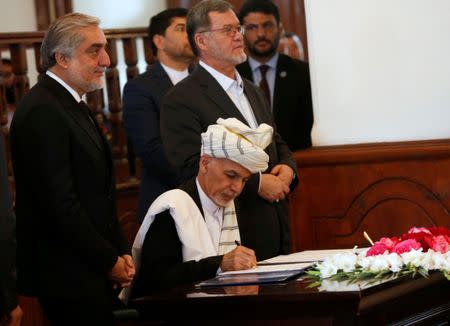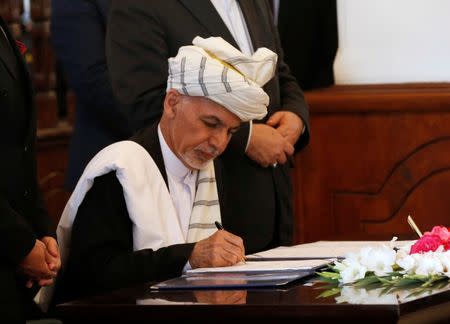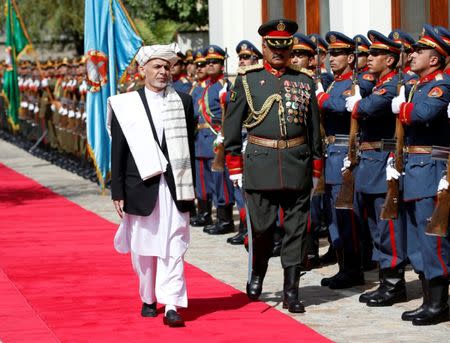U.S. may consider lifting sanctions on Afghan warlord - official
By Hamid Shalizi and Josh Smith KABUL (Reuters) - The United States may consider lifting sanctions on one of Afghanistan's most notorious warlords after a peace accord was signed in the Afghan capital on Thursday, a U.S. official said. Afghan president Ashraf Ghani formalised the controversial arrangement with Gulbuddin Hekmatyar in a deal the government hopes will lead to more peace agreements. Surrounded by hundreds of Afghan officials, many former warlords and rivals themselves, Ghani signed a pact that opens the door to the militant faction of Hezb-i-Islami, led by Hekmatyar, playing an active role in politics. A controversial figure from the insurgency against the Soviets in the 1980s and the civil wars of the 1990s, Hekmatyar has been designated a "global terrorist" by the United States, which has been leading an international military mission in Afghanistan for the past 15 years. As part of the deal, the Afghan government agreed to lobby international organizations to lift sanctions on Hekmatyar and Hezb-i-Islami. “We will seriously consider any sanctions delisting request put forward by the government of Afghanistan," the U.S. official, who did not want to be identified, told Reuters. "If the security council deems the sanctions imposed on certain individuals to be outdated and no longer in the interest of Afghan peace and stability, then we will need to reconsider these measures." The U.S. Embassy, the United Nations, and other international organizations have publicly praised the accord as a step toward resolving the conflict in Afghanistan. Despite the rhetoric of unity, Hekmatyar was not present and addressed a gathering in Kabul in a recorded video message, appearing by himself to sign the document in a small room. "With this agreement, I hope to put an end to the current crisis in the country," Hekmatyar said in his message. "I call on all sides to support this peace deal and I call on the opposition parties of the government to join the peace process and pursue their goals through peaceful means." He reiterated his calls for an end to "foreign interference" and for all foreign troops to leave Afghanistan. Hekmatyar, who served as prime minister in the 1990s, before the rise to power of the Taliban, has long been known as close to neighbouring Pakistan, and he received U.S. aid during the fight against the Soviets. His faction of Hezb-i-Islami has played a relatively small role in the current conflict, in which the Taliban have a leading role in battling the Western-backed government in Kabul. But government officials hope the accord will be a first step toward eventually making similar peace deals with the Taliban and other groups. "This is a chance for the Taliban and other militant groups to show what their decision is: To be with people and join the respected caravan of peace, like Hezb-i-Islami, or confront the people and continue the bloodshed," Ghani said. Peace talks with the Taliban, the largest insurgent group, have yet to get off the ground, but both sides have said they are open to the idea. Human rights groups as well as many Afghans expressed dismay that Hekmatyar is unlikely to face any punishment for his alleged role in past abuses, including firing rockets into civilian areas during a civil war in an attack that killed and injured thousands of residents. Hekmatyar's return "will compound the culture of impunity", said Human Rights Watch researcher Patricia Gossman, who called it an "affront" to victims of abuses when the initial deal was struck last week. (Writing by Josh Smith; Editing by Robert Birsel and Nick Macfie)

 Yahoo News
Yahoo News 



